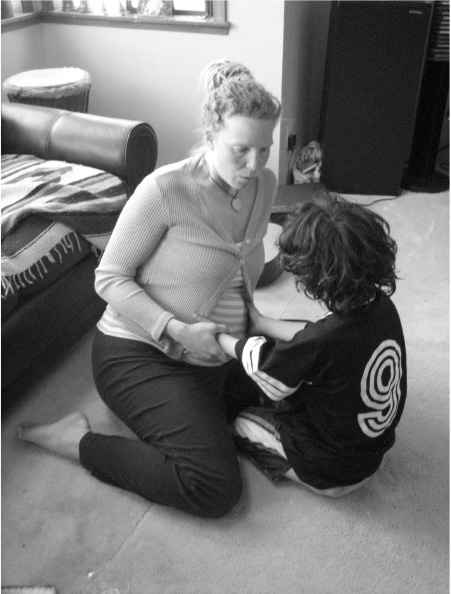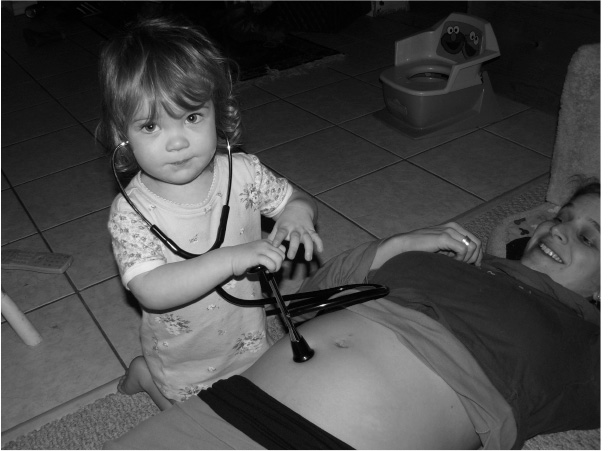
A photo of me during my labor with my daughter, who was born at home in Tlell. My son Taro is helping me through a contraction. He was so sad that I was soon to lose my belly!
by Celina Laursen
When I was eighteen years old, I attended my first birth. I always called it an accident, but one could argue that there are no accidents. My roommate and close high school friend was pregnant, and honestly I must say, at that age, and being wrapped up in my own life, I hardly remember her pregnancy at all as being significant. I don’t think I was a very good friend in that regard at that time. Well, Kelly-Jo went into labor one evening at our house. Her mom, whom I knew well, was there. We sat around at the kitchen table while Kelly labored. I made her toast and we told jokes and kept it light. At some point, she and her mom decided it was time to go. Kelly’s mom and I helped her through her contractions on the way to the car and I wished her good luck. I guess by that time I had inadvertently become part of her laboring rhythm and she made me get in that car with her! She was in good active labor when we arrived at the hospital, and soon enough she was pushing with all of her might lying on her back, with me holding one of her legs, and her partner holding the other. She pushed out a baby boy who, to my horror, had the most oblong head I had ever seen. I thought he was malformed for life. I don’t know when I was told or realized myself that the “malformation” was a pretty normal head shape for a brand new babe! That was the last birth I ever thought I would see, and I certainly did not ever anticipate going through it myself.
I did, however, go through it myself. Twice. My first child was born the same year we were told “No Births on-Island.” Women were to be sent out away from their family and their communities weeks before their due dates at their own expense (or the Band’s for First Nations) to await the birth of their babies. I couldn’t believe that women and their families had no other option than to leave their homes to have their babies. It was so difficult to fathom that something as natural and as essential as birth was being removed from our communities. Later, at the northern end of the Island, the Masset Hospital would call it a “moratorium” on birth—imagine! Many women and families on the Islands shared my disbelief at not having a choice, and many of us decided that we would just stay and birth at home anyway—and many did.
I, however, was shipped out the day my water broke to Prince Rupert by air ambulance. My birth team had followed me to Prince Rupert to support the birth, and I was fortunate that all went well, quickly, and without any problems for myself or my new son.
A few months after the birth of my own son, I found myself at another birth. A young woman I knew was at the local hospital laboring with her first baby. I was in a nearby café when someone came in asking if I would take some muffins up to the hospital for the woman’s partner and birth support team, who had been up for quite some time. I gladly obliged of course. When I arrived, the support people were very tired. I was a new energy coming into the room, and the woman asked me to stay.
There it was, happening one more time “by accident,” and my career as a doula began. Later on, I trained formally as a doula, and attended births on Haida Gwaii as well as a few off-island with women who left to birth. The more I listened to women and their stories, the more the path toward midwifery became clear. With an enormous amount of unending support from my partner Darrell, my son Taro, and from so much of the community, I went back to university at the University of British Columbia and completed my midwifery degree. My degree was briefly interrupted for a year when I took respite at home to have my daughter Yoshiko, who was born at our home in Tlell. I finally returned home to Haida Gwaii in 2010, reintroducing midwifery back to the communities, hopefully for a long time to come. Currently, with help from the islands’ communities, the Queen Charlotte Hospital administrator, nurses, and general practitioners, midwifery has been successfully integrated and we do the best work we can to provide safe, personal care for women and their families whether they choose to birth here or away.

A photo of me during my labor with my daughter, who was born at home in Tlell. My son Taro is helping me through a contraction. He was so sad that I was soon to lose my belly!

Yoshiko using the fetoscope on our dear friend, pregnant with twins!
Celina is the first registered midwife for the remote islands of Haida Gwaii.